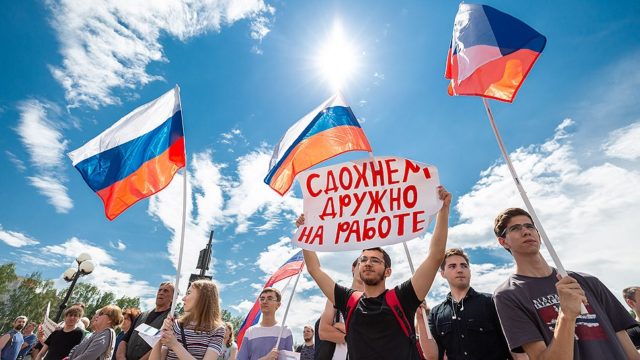
Pension Reform in Russia: Far From Forgotten
By:

Much of the recent focus on Russia has been on the World Cup and the Helsinki Summit, but Russians domestically have not forgotten about the government’s controversial ongoing pension reform plan. The population is extremely unhappy with the proposal to raise the pension age from 55 to 63 for women and from 60 to 65 for men (Komsomolskaya Pravda, June 14). However unsettling, one should not necessarily expect overly dramatic blowback from this series of reforms. The Russian presidency of Vladimir V. Putin will not be taken down by discontent over this measure, although there is a chance that it might undermine his United Russia party and shake his legacy going forward.
As the World Cup soccer championship approached its finale, the St. Petersburg think tank Peterburgskaya Politika released a report arguing that the tournament, which Russia hosted for four weeks this summer, had not “outshone pension reform” in the country (Vedomosti, July 10). The report also goes on to provide a chart of regions ranked based on their opposition or interest in the reform. The country is split; but it is notable that there has even been a public conversation on this subject in the first place. Over the years, Putin’s government has been buoyed by its popular support and could usually take advantage of surges in nationalistic or patriotic feelings (such as from the annexation of Crimea) to boost its perceived legitimacy at home. However, pension reform has been so contested that not even Russia’s historic performance in the World Cup could cover up and soothe this widespread anger.
The blowback from these reforms has raised serious concerns within United Russia. And while the potential for a revolution is highly unlikely, the party’s wide control of local and federal government institutions may now be in danger. Twenty-two regional governor and 16 regional government positions (including 4 mayoral elections) are up for grabs on September 9 (Vedomosti, July 10). According to sources cited by Vedomosti, this makes United Russia officials—Putin and Prime Minister Dmitry Medvedev included—extremely nervous about the effect the announced extensions to the retirement age could have on these elections.
The draft bill outlining the reforms made it through the first stage of deliberation in the State Duma (lower chamber of the Russian parliament) last week (July 19), with 328 in favor and 104 opposed. Notably, one of the votes cast against the measure came from United Russia deputy Natalya Poklonskaya, a parliamentarian from occupied Crimea; eight United Russia deputies did not participate (Meduza, Vedomosti, July 19). As a concession to the bill’s opponents, discussions on amendments and other odds and ends have been extended from August 18 to September 24. The government clearly realizes how unpopular the bill is but has been unable to push it through as quickly and quietly as it would have wanted.
After some past doubt from Putin regarding the reforms, he has changed his tone as of late. He recently noted that, without pension reform, the system itself will run out of money: “For every five pensioners, there are six people working. If this balance worsens, the system will go broke” (RIA Novosti, July 20). At this point, Putin and United Russia have pushed too far to back off.
Although pension reform is not expected to jeopardize the longtime Russian leader’s hold on power, it has shed some doubts as to his legacy. It is quite possible that the last few years of Putin’s reign as president will be characterized by a population that, while not in open revolt, holds heavy disdain for its government (Windowoneurasia2.blogspot.com, July 19). Russians are unhappy that Putin’s promises—including his persistent pledges during the presidential campaign not to raise the retirement age—are not being met. And this betrayal will be remembered for many years to come.



